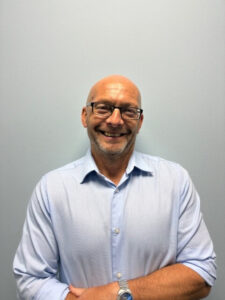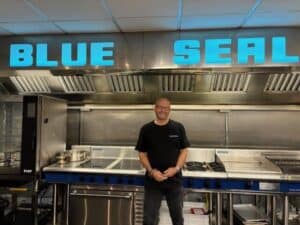The word ‘community’ isn’t just a marketing strapline for our catering equipment buying group.
We live by this word in all we do, as shown by how we engage with and promote our members.
With this in mind, we’ve created a new, ongoing interview series entitled ‘A Coffee With’.
Through these interviews, we can interact with our members on a deeper level, get to know them better, and allow our other members to find out more about them in the process.
Our first interviewee is Glenn Danks, UK Branch Manager at Blue Seal.

Part of the Ali Group, Blue Seal specialises in the design, manufacture, distribution, and after-sales support of food service and bakery equipment.
Without further ado, here’s what Glenn had to say.
Can you start by describing your career to date and explaining how you made a foray into the commercial catering industry?
I actually started off as a trainee grain trader for a company called UAM (United Agricultural Merchants) in 1982.
I spent time going around farms, which was interesting. I met some intriguing characters!
I’d just passed my driving test, and I was trying to save up for a car. Occasionally, if I was going out to one of these farms, if they needed some animal feed, for example, one of the sales guys would ask me to run it up to the farm.
I was based in Stratford-upon-Avon. I was driving Ford Capris and Ford Granadas through the town centre, and I was only 18. I thought I was so cool!
To look at some of the farmers, you wouldn’t think they had two pennies to rub together, but seeing the land and properties they owned was incredible.
Around this time, the dairy quotas were brought about, and they had a big impact on UK farming. Unfortunately, I was one of the casualties.
After this two-year spell in farming, I went in a totally different direction and trained to be a legal executive, which I didn’t enjoy at all. The best thing about it was the Friday lunchtime drinking sessions!
So that didn’t last long, and then I was offered a position at Blue Seal.
I joined Blue Seal on 1st June 1988, and I was only the fifth person to join in the UK office.
What do you remember from the early days of working for Blue Seal?
My colleagues and I did everything between us.
We packed spares, we swept the floors, and we brought the equipment in through a goose-lift up to the fourth floor of our building here in Birmingham.
I was typing up invoices and recording stock movements on cards—that’s how long ago it was!
Things developed from there. I started going out on the road after 12 months, and I eventually progressed up to UK Branch Manager, a position I’ve held for the last 14 years.
How do you feel the first five or six years of your career equipped you to be as successful as you are in your current role?
I remember my first Managing Director at UAM, who was an ex-forces guy.
He was very disciplined with regard to timekeeping, tidiness, and the way you present yourself, and I think that’s given me a good grounding.
I also learnt early on the importance of being respectful towards people. I was very young and meeting some wealthy farmers, so I had to be respectful and polite.
You can have all the qualifications in the world, but if you’ve got a good heart and a solid work ethic and you’re polite to people, this all goes an awfully long way.
I found I couldn’t express myself in my legal role as much because the profession was so black and white.
That’s why I wanted to get back to meeting people and interacting with different people from all walks of life, which has happened with Blue Seal.
What have been some of the biggest highs of your career so far?
Because I love sport, my involvement in the redevelopment of Wembley Stadium in the early 2000s would have to be up there. My two colleagues and I were tasked with commissioning the stadium’s convection ovens.
I was also involved in the reconstruction of Ascot Racecourse’s grandstand between 2004 and 2006 and the development of Arsenal Football Club’s stadium (the Emirates Stadium) around the same time.
The last big sports-related project we worked on was the development of the Tottenham Hotspur Stadium, and this project involved delivering training alongside a consultant. It was absolutely fascinating to see that evolve—it’s the best sporting facility I’ve ever been to.
Those are probably the highlights, together with the first time Blue Seal did £2 million of revenue in a month.
When we first did £100,000 in a month, the then-UK manager took us out to TGI Fridays; that was our treat.
I always look back to that moment to contextualise where we were and where we are.
It’s taken a long time and a lot of hard work, but we’re in a great place.
What have been among the low points, and what have you learnt from them?
Every day, I learn something new about myself, my team, and life in general, but in terms of my professional life, COVID was probably the lowest point.
I didn’t work a day from home because we supplied nursing homes with spare parts. I live in Stratford-upon-Avon, and I travelled to Birmingham every day.
There was just me and the warehouse manager from the end of March 2020 all the way through to the summer, as most people were furloughed.
Because the equipment was manufactured in New Zealand, it continued to come over. We were literally unloading containers and filling the warehouse.
Just the two of us being in the office with the phone ringing occasionally was quite eerie. It was a strange time, and we didn’t know what was around the corner.
I’d say that was the lowest point of my professional life because of the uncertainty, and hospitality was affected as much as, if not more than, most industries for a long time.
Would you say the industry is still feeling the ripple effect of COVID?
Definitely.
Stratford-upon-Avon’s population is much higher than when I was young, and there’s housing on every field, yet when you go out in the town, it’s virtually empty.
This is undoubtedly a ripple effect of COVID, when people spent money on their property and got into the habit of going to people’s houses to eat and drink. I think that still has an effect today.
The pubs were packed when I was younger, even with a smaller population, but nowadays people have got into this habit of saying, ‘Come round.’
The ‘work from home’ culture that’s exploded in popularity post-COVID has undoubtedly played a part, as well.
You look at places like coffee shops, sandwich shops, and cafes that relied on people going into cities, and many of them are empty.
Working from home was unusual pre-COVID, but now it’s the norm, and many businesses haven’t recovered from this new normal.
What challenges do you think lie ahead for the commercial catering industry?
There was a huge uplift once the restrictions were lifted. I think most people saw a big spike in business, even from pre-COVID. Now it’s settled down an awful lot more, and people are evaluating where they are.
We’re very successful with high street chains, and they’re consolidating.
However, there have been a lot of closures, which means, unfortunately, there’s a certain amount of used equipment available. Some clients have been moving equipment around, so they wouldn’t necessarily need brand-new equipment.
I’d say that’s had an effect, as has the business tax relief reduction from 70% to 40% and the increase in national insurance payments from employers. There are interesting times ahead, for sure.
In a nutshell, how does Blue Seal help its customers?
This is a very competitive industry, and I can think of two main competitors that are far larger, particularly in numbers of people.
But the beauty of Blue Seal—and people say this to me all the time—is that customers can ring me anytime, and because I’m such an old man who’s been here so long, I know virtually all of them.
They can call or email me to enquire about a spare part, and I’ll sort it straight away.
That’s what Blue Seal is all about. It doesn’t matter who you are; we all strive to help you, and I like to lead from the front on this.
Blue Seal also offers incredible value for money. I would say this even if I didn’t work for the company. We have many people in our showroom and test kitchen.
Ultimately, we treat people how they want to be treated. That’s why we retain so many of our customers and continue to grow year on year.
Which one aspect of working for Blue Seal do you enjoy the most?
It’s every time I look in a kitchen when I’m out and I see a line-up of Blue Seal equipment. That is the biggest achievement.

The equipment is quite distinguishable, as it’s got a blue fascia, so it’s easy to recognise.
Because we sell through distributors, I don’t always get to know where the equipment might end up, so when I do get to see it, that fills me with enormous pride.
I get the same warm feeling every time.
The novelty of representing Blue Seal never wears off. We’re part of the Ali Group, which owns so many foodservice equipment companies all over the world, but I still treat this business like it’s mine. I’m so invested in every penny that goes into Blue Seal.
That, I think, is the best way to look at your work. Whether you like it or not, you spend more time at work than at home, so you’ve got to try and enjoy it.
I think the best way of doing that is to invest yourself in the business.
As I said earlier, one thing that’s always stood us in good stead is treating people how we’d want to be treated. All of our guys who are customer-facing have been here for more than 20 years, and we’ve formed some great friendships with our customers. Being so small in numbers, we’ll do everything to help people.
We’re part of ENSE along with many of our customers, which is why ENSE works so well for us.
What changes have you noticed in Blue Seal during your time with the company?
If there’s one significant change I’ve noticed, it’s the food offerings within pubs.
I remember a time when pubs would open from 11am until around 2pm, then they’d close, then they’d reopen at 6pm, and the food offering was pie and chips if you were lucky.
The whole industry has turned on its head in this respect, with a lot of establishments now providing breakfast, lunch, and dinner.
This change was inevitable. Pubs that stayed ‘wet’ were always going to struggle to survive unless they were next to a football stadium or music venue because they simply wouldn’t make enough money. You’ve got to have a food offering nowadays.
The industry has totally changed in other ways, as well.
There are more food-related programmes on the TV—chefs are now considered sexy!
How we look at equipment has completely changed. Once upon a time, you’d turn equipment on for a few hours, then turn it off, whereas now, equipment is on for 15 hours a day in some cases.
How do you think the commercial catering industry will evolve in the next five to ten years?
I talk about the lack of young people in our industry on a regular basis, and I think this issue is now being addressed.
Only in the last few years have I noticed a real effort being made to attract young people into the industry, male and female.
And to me, this inclusivity and availability of opportunities are really important.
There was a time, not that long ago, when you were almost looked upon as a failure if you didn’t go to university.
And I think this mindset was a real mistake because, foolishly, apprenticeships and trade were ignored and discouraged.
People were encouraged to go on to further education, and as a consequence, there’s now a real lack of qualified engineers, not only in the commercial catering industry but in life.
Thankfully, this is being addressed, and people are being encouraged to enter into trade, which this industry needs in a big way.
These apprentices can soak everything up at 17, 18, or 19, immerse themselves in the technology, and really evolve with the industry, which is a very exciting prospect going forward.
What are your interests outside of commercial catering?
I love sport, and I try to keep as active as possible.
I enjoy watching football, rugby, and squash—I play squash three times a week, and I play at county level.
I still play five-a-side football and occasionally for my football vets team.
I go to the gym with my son.
I also watch a lot of live music and love to travel.
Those are my biggest passions.
Where in the world do you like to travel to enjoy good food?
I love going to Asia because it’s so simple and you get such great value for money.
I like the Spanish way of life, too. I’m slightly biased in that my partner is from Madrid, and I often go to Spain to visit family, but when I eat food over there, it’s a real occasion.

We know places in the centre of Madrid where you can get so many free tapas that you can give yourself a good feed just from this!
You reach the stage where you say to the waiter or waitress, ‘No more tapas. Just bring me beer!’ It’s a totally different way of life from what we’re used to in the UK.
I’d like to spend more time in South America. It’s a whole event enjoying food and drink over there, which I love.
If you’re in a restaurant that contains an exhibition kitchen, do you ever find yourself peering in to see what equipment is being used?
Oh, yeah. I’m terrible for it.
Everywhere I go, I try and have a look in the kitchen to see what equipment’s being used, and it’s fascinating.
Sometimes, I’ll poke my nose around the corner, and I’ll see very little equipment, yet it’s astonishing what the restaurant brings out of the kitchen.
To produce that quality of food with so little equipment requires a hell of a lot of skill.
This is a great industry to be part of.
How has being part of a commercial catering equipment buying group benefitted you?
We’ve been part of ENSE for quite a few years, and every time we go to its annual Partnership Summit & Awards, it’s like going back to an extended family.
There’s a real camaraderie and feel-good factor in the room, and we’re very happy to be part of this group. It’s done nothing but good for us, and we’re big advocates for ENSE. I can’t recommend it enough to other businesses in our industry.
Thank you to Glenn for his insights.
Enquire about joining ENSE today
If you’re intrigued by what Glenn said and want to see what all the fuss is about, you can find out more about us and how we can help you by contacting us at 07775 643557 or 07500 778457 or [email protected].
The best time to join ENSE was yesterday; the second best time is today.
